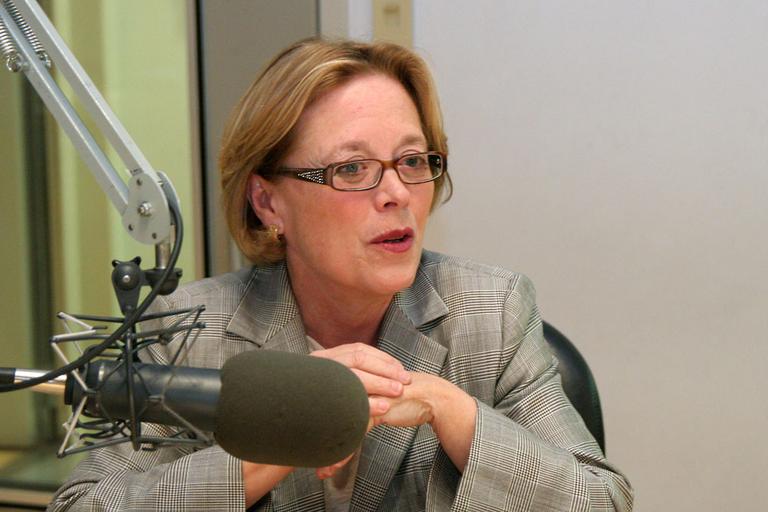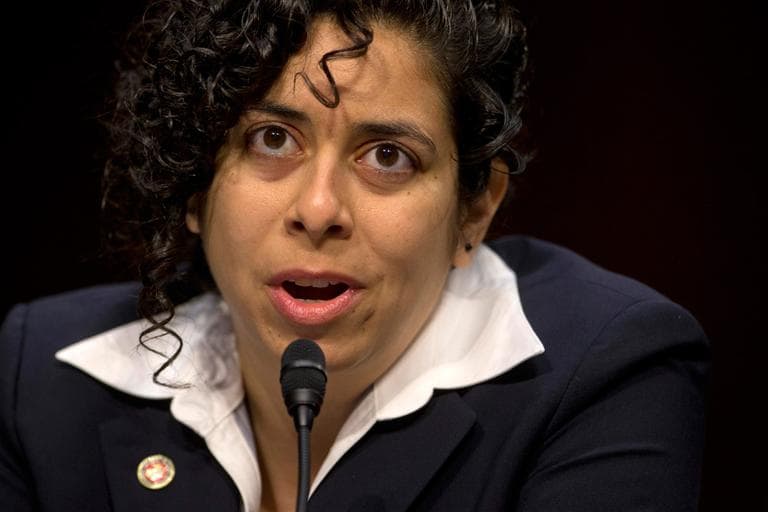Advertisement
Rep. Tsongas: 'A Long Way To Go' On Military Sexual Assault
ResumeThe Pentagon estimates 19,000 service members are sexually assaulted every year, but a small fraction of the assaults are reported, and an even smaller percentage of those are prosecuted. And women in the military are twice as likely to be assaulted as women in the general population.

Wednesday night at Tufts University, U.S. Rep. Niki Tsongas will host a panel discussion and screening of the recent Oscar-nominated documentary "The Invisible War," which exposes the military sexual assault problem. Here's an excerpt in which Tia Christopher describes the response she got when she reported being raped during Navy training:
And they took me before my lieutenant commander. He says, "You think this is funny?" And I said, "What do you mean?" He's like, "Is this all a joke to you?" I was like, "What do you mean?" And he goes, "You're the third girl to report rape this week. Are you guys like all in cahoots? Do you think this is a game?"
WBUR's All Things Considered host Sacha Pfeiffer spoke about the problem with Anu Bhagwati, executive director of the Service Women's Action Network, and Congresswoman Tsongas, who told us she first became aware of the extent of military sexual assault during some Capitol Hill hearings and public events when she was newly elected back in 2007.
Rep. Niki Tsongas: And one of the women, a woman who had been deployed several times — she was a nurse — said, "Ma'am, I am more afraid of my soldiers than I am of the enemy." And as she traveled around the base, she had knives inserted in her waistband so could protect herself if need be. She had never been assaulted. She was determined never to be assaulted. But she felt a constant threat. So from that point on, I and my office have taken it very seriously, that despite all the service's efforts, they have a long way to go.
Sacha Pfeiffer: Anu, you have testified before the Senate Armed Services Subcommittee that when you were a Marine Corps captain, you experienced daily discrimination and sexual harassment and that the military culture was filled with sexism and rape jokes and pornography. When you finally decided to come out and speak about this, what did you experience? Support, or not support?
Anu Bhagwati: I chose to speak out regularly about it. I couldn't stay silent, and it wasn't easy. I was regularly sort of told to sit down and shut up, so to speak. And so when I had a little bit more rank and I was a commander myself, and I was getting the reports of assaults — it wasn't just me being harassed or discriminated against, but it was my troops who were reporting these incidents to me — I was very limited in what I could do, because my senior officers would sweep these incidents under the rug after I reported them.

That gets at the idea that this is at least a two-fold problem, maybe a multi-fold problem. Because it's not just the high number of assaults, but this really deeply flawed system, it seems, for reporting and investigating them. Would you explain what makes it this sort of double problem?
Niki Tsongas: The military has to be — is built on trust; the capacity of everybody to work together under very challenging circumstances requires an element of trust that is unusual. So to be raped or assaulted by one of your own violates that trust in a very personal way.
Then, secondly, as you take these allegations of these crimes to the commander, it's the commander's decision whether or not to move ahead. And often commanders want to sweep it under the rug. They are inherently conflicted. Their desire is just to keep the unit intact and move ahead. Then often there are a lot of reprisals, both professional reprisals and personal reprisals. Again, another violation of trust.
The Department of Defense is taking what seem to be some pretty big steps to tackle the problem. It's created this office to respond to and try to prevent sexual assaults. Zero tolerance, I believe, is now taught in basic training. The military also has a program to encourage bystander intervention, to get other people to step in. Congresswoman, how much do you think those are helping?
Niki Tsongas: Well, I think at the very least they're a recognition of the fact that everything they've done prior to this has not been particularly successful and that they've got to continue to work at it. "The Invisible War," the bipartisan activities of the House Armed Services Committee, the various news reports that are coming forward too frequently — Lackland being the most recent example of it...
... That's the Air Force base where there had been numerous allegations of sexual assault and harassment of recruits.
Niki Tsongas: Yes, in the training units, which is a particularly vulnerable time — I think really just highlight the fact that there is much work to be done.
How do you change a mentality that seems to be so ingrained?
Niki Tsongas: From my point of view, it is to take these crimes very, very seriously and encourage a culture that pursues them to the end — so that as that becomes ever more clear, that you see less and less instances of this crime.
I wonder, though, if either of you think that ultimately the military can correct this problem on its own, or if outside involvement is needed? Like dealing with allegations in civilian courts, or giving authority over criminal cases to independent prosecutors, rather than commanding officers?
Anu Bhagwati: What we want to do is see a professionalized military justice system, where the folks who are making those decisions, both from point of the victim and the accused — that the person making those decisions is a trained prosecutor or a judge, not commanders. But that has to come from congressional pressure.
Anu, given what seems to be the magnitude of this problem, what do you say to young women who are planning to go in the military, or thinking about it, or their parents?
Anu Bhagwati: We shouldn't discourage young women from pursuing their dreams. Frankly, we should just improve the military and make sure that our young people aren't being harassed and assaulted. I believe that the folks who are joining the military right now just generally don't understand the kind of rights that they will no longer have access to. I mean, certainly when I signed my name on many, many contracts way back when to join the Marines, I had no idea what wouldn't be available to me if I were harassed, discriminated against, assaulted, etc.
Niki Tsongas: I would agree with Anu. You know, it's only when you have women at the table, and women as part of the military, that you force change. And I think women should come with their eyes wide open and understand what risks might be. But we need women in the military.
Pfeiffer also spoke with the deputy director of the Department of Defense's Sexual Assault Prevention and Response Office, Col. Alan Metzler.
Col. Alan Metzler: Clearly we need to make improvements to the system because there are way too many sexual assaults. We have a sexual assault problem. We need victims to know that when they report a crime that we will take these reports seriously. One of the common myths out there on the issue of sexual assault is that there are a lot of false reports, and we know that the incidence of false reports is very, very low — in the 2 to 8 percent range. Very soon, commanders across all services at all levels will start to be trained on these issues.
Sacha Pfeiffer: Could you walk us through what happens now if a woman or a man reports a sexual assault to her or his commanding officer?
The current policy is that commanders do not investigate crimes of sexual assault. In fact, if a victim of sexual assault chooses to report it to their commander, the commander has a duty to report it to a professional military criminal investigative organization. Each of them are stand-alone and independent of the chain of command. The victim also has options to report to a number of other activities — the sexual assault response coordinators, victim advocates, or to medical professionals as well.
And how is that process that you just described different from what typically happened in the past?
Well, that process isn't different than what typically has happened in the past. There is a misconception that the department's policy was that victims of sexual assault reported to their commander and were mandated to do that. That is not the case.
But we hear cases of victims saying commanders did get involved, in some cases they dismissed or covered up cases. Despite the system that's been in place for a long time, are there times that commanders have been involved in ways they shouldn't have been?
There are lots of examples where justice wasn't done from the perspective of victim, there's no doubt about that.
This program aired on March 27, 2013.

